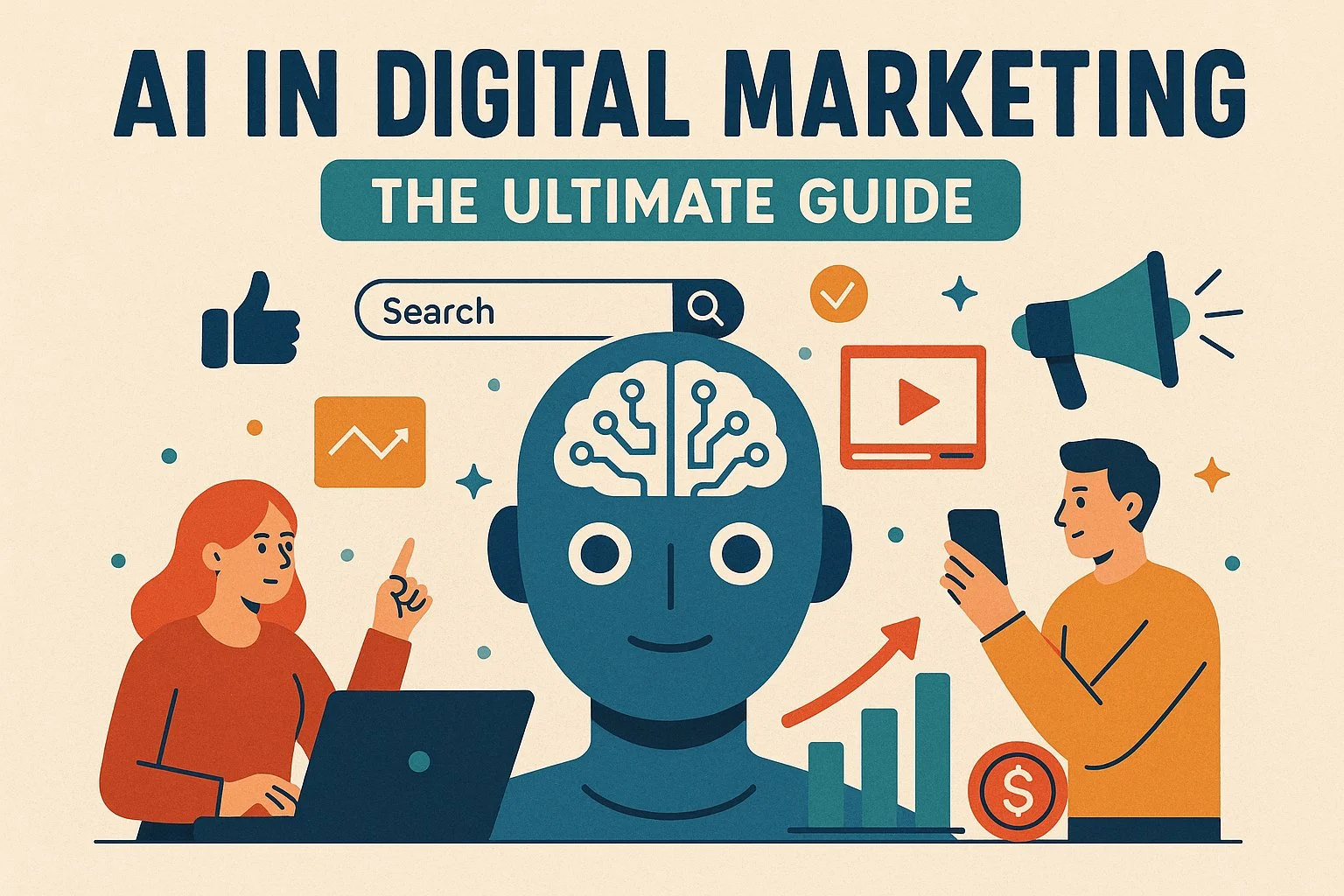AI in Digital Marketing - The Ultimate Guide
Artificial Intelligence (AI) is no longer a futuristic concept — it’s transforming how marketers work every day. From personalization and predictive analytics to content creation and customer experience, AI in digital marketing is redefining what’s possible for brands and professionals alike. According to the latest report, marketing leaders believe AI will have a major impact on productivity (50%), efficiency (45%) and innovation (38%) (DMI, 2025). For students, marketers, and career-changers, understanding how to harness AI is no longer optional — it’s essential for staying competitive.
In this guide, we’ll explore how AI is changing digital marketing, practical tools and examples, the opportunities and challenges it brings, and the key skills you need to thrive in the AI era.
What Is AI in Digital Marketing?
Artificial Intelligence (AI) in digital marketing refers to using intelligent systems — such as machine learning, natural language processing (NLP), and data analytics — to automate marketing processes, gain customer insights, and optimize campaigns.
AI helps marketers understand customer behavior at scale, predicting needs and tailoring content in real time. The more data the system processes, the more accurate and personalized its output becomes. Crucially, AI doesn’t replace human marketers — it enhances them. As AI educator Kerry Harrison explains, “There’s still a huge need for human creativity, thought, and strategy. AI should complement, not replace, the marketer’s role.” At a strategic level, companies are also rethinking their workflows and creating new AI-focused roles. A recent survey found that organizations adopting generative AI are redesigning operations, building AI governance frameworks, and retraining teams to use these tools effectively (McKinsey, 2025).
Popular AI Tools for Digital Marketing
While ChatGPT is often in the spotlight, marketers have a growing toolbox of AI-powered marketing tools across every function — from content marketing to SEO, automation, and analytics.
Here are some notable examples:
Writer – AI content generation and repurposing tool
Midjourney – text-to-image generator for visuals and ads
Optimove – AI-driven customer data platform for personalization
Zapier – workflow automation connecting multiple apps
Manychat – NLP-based chatbot for WhatsApp and social channels
Evolv.ai – real-time optimization of user experiences
Surfer SEO – AI-assisted on-page optimization and keyword analysis
Mailchimp AI – predictive send-time optimization for email marketing
Perplexity – AI research assistant with source citations
Drift – conversational AI for lead generation
Buffer – AI-enhanced social media management
Tableau – data-visualization platform with AI-powered insights
Learning to use these tools helps marketers become more efficient, creative, and data-driven — three traits employers value highly in today’s digital marketing careers.
Examples of AI in Action
AI is already reshaping how global brands connect with audiences. Sephora uses AI chatbots and its Virtual Artist App to deliver personalized beauty recommendations, driving billions in e-commerce growth. Netflix applies machine learning to analyze user behavior — what you watch, pause, and skip — to recommend new shows and reduce churn. Coca-Cola uses generative AI to create ad visuals and optimize creative testing. These examples show that AI marketing strategies work best when they combine automation with a human touch. In Hong Kong, brands in retail and hospitality are increasingly using AI chatbots to improve multilingual customer service and online booking experiences (HKPC, 2023).
How to Use AI in Digital Marketing
AI is now accessible for businesses of all sizes. Here’s how marketers are using it across key areas:
1. Content and Image Creation
Marketers often struggle to create quality content quickly. AI copywriting tools like ChatGPT, Claude, or Jasper can generate blog posts, ad copy, social media captions, and email headlines in seconds. However, AI-generated content should always be edited to ensure tone, creativity, and brand authenticity. Use AI as an assistant — not a replacement — for your content marketing.
2. Customer Service and Support
AI-driven chatbots are now standard across e-commerce, finance, and travel. They provide instant answers, guide customers through purchases, and escalate complex issues to human agents. This improves customer experience and frees marketing teams to focus on higher-value engagement. In Hong Kong, nearly 70% of consumers expect real-time digital support from brands (PwC, 2024).
3. Customer Segmentation
AI can analyze massive datasets to group customers by behavior, preferences, and purchase intent. Marketers can then deliver personalized messages and recommendations at scale. NLP also helps interpret customer reviews to refine products and services — a key competitive advantage in crowded markets.
4. Search Engine Optimization (SEO)
AI in SEO is transforming how search engines understand content. Tools like Surfer SEO or Alli AI analyze top-ranking pages and help marketers optimize keywords, headings, and structure. Google’s AI Overviews (formerly Search Generative Experience) are also changing how people search — making AI-assisted SEO strategies more important than ever. AI can automate keyword research, predict ranking trends, and even generate metadata and schema tags. For Hong Kong businesses, this means reaching local search audiences more efficiently.
5. Pay-Per-Click (PPC) Advertising
AI-powered PPC uses predictive modeling to improve ad targeting, bidding, and creative testing. Platforms like Google Ads Smart Bidding and Meta Advantage+ optimize campaigns in real time to maximize ROI. AI can also detect click fraud, forecast campaign performance, and adjust bids automatically — helping businesses make the most of their ad budgets.
6. Data Analytics
With data pouring in from multiple channels, AI analytics tools help marketers uncover insights faster than ever. AI can identify customer trends, detect anomalies, and predict future behavior. In Hong Kong, data analytics and AI are key drivers of the city’s digital economy — the 2023 blueprint predicts a substantial contribution from these technologies to Hong Kong's GDP by 2030 (ITIB, 2023). Combining AI with analytics enables hyper-personalization, allowing brands to deliver exactly what each customer needs — when they need it.
7. Email Marketing
Email marketing remains one of the most cost-effective channels, and AI makes it even smarter.
With tools like Mailchimp AI or HubSpot, marketers can:
Predict optimal send times
Personalize subject lines
Segment audiences automatically
Conduct A/B testing
Analyze performance in real time
AI can even craft dynamic email content that adapts to user behavior.
In Hong Kong, the E-mail Advertising Market is experiencing a notable shift towards hyper-personalization, with brands increasingly leveraging data analytics to craft targeted email campaigns that resonate with individual consumer preferences (Statista, 2025).
The Pros and Cons of AI in Digital Marketing
Like any transformative technology, AI brings both opportunities and challenges.
Benefits
Boosts productivity – automates repetitive tasks, freeing time for creative work
Improves efficiency – streamlines workflows and campaign management
Reveals insights – drives data-driven decision-making
Enhances personalization – tailors experiences at scale
Increases ROI – optimizes spend and predicts consumer behavior
Supports content creation – scales high-quality content across channels
Challenges
Data bias – AI systems reflect the quality of their training data
Inaccuracy – errors in datasets can skew results
Ethical concerns – privacy, transparency, and authorship issues
Security – sensitive customer data must be protected
Dependence on automation – over-reliance may weaken creativity or intuition
Ethical and responsible AI use will become a defining factor in digital marketing careers moving forward.
Key Skills for AI-Driven Marketers
To use AI effectively, marketers need both technical and human skills.
Technical Skills
Data management and analysis
Marketing automation tools
Testing and optimization
Content personalization
Process improvement
Soft Skills
Strategic thinking – aligning AI initiatives with business goals
Creativity – adding originality and storytelling
Innovation – experimenting with new tools and trends
Agile thinking – adapting to fast-changing technologies
Conclusion
Artificial intelligence can seem intimidating, but it’s a powerful ally for marketers. Instead of replacing your role, AI amplifies your impact — handling routine tasks so you can focus on creative and strategic work. Mastering AI in digital marketing not only enhances your performance but also makes you more competitive in Hong Kong’s fast-growing digital economy. Now is the time to explore, experiment, and upskill.
Igniting Your Path to Success with Bonfire
At Bonfire, we offer the Certified Digital Marketing Professional (CDMP) – DMI Pro, a self-paced online program where you’ll learn the most relevant and up-to-date digital marketing skills.
This course will teach you the fundamentals of digital marketing while diving into key specialisms such as SEO, SEM, email marketing, social media marketing, and much more.
It’s designed to give you the confidence and expertise to thrive in today’s competitive digital landscape.

